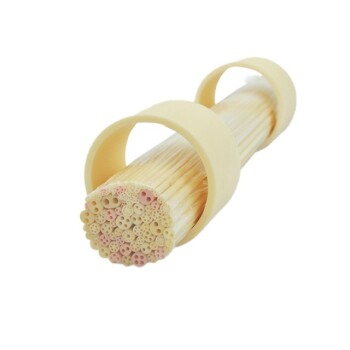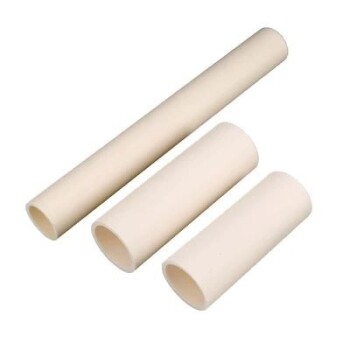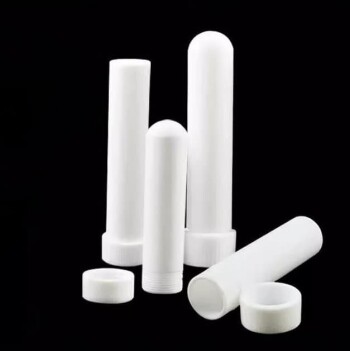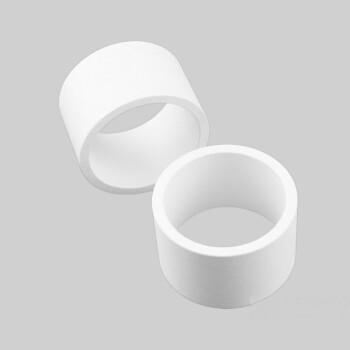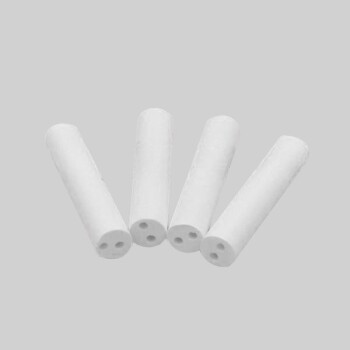The short answer is this: The material itself, fused quartz, has a design tensile strength that can exceed 4.8 x 10^7 Pa (7,000 psi). However, this is not a direct pressure rating for a tube. The actual pressure a specific quartz tube can withstand is critically dependent on its wall thickness, diameter, surface quality, and operating temperature.
The most important takeaway is that there is no single, universal pressure rating for a "quartz tube." You must think of it as a system whose strength is determined by its specific dimensions and condition, not just the material it's made from.
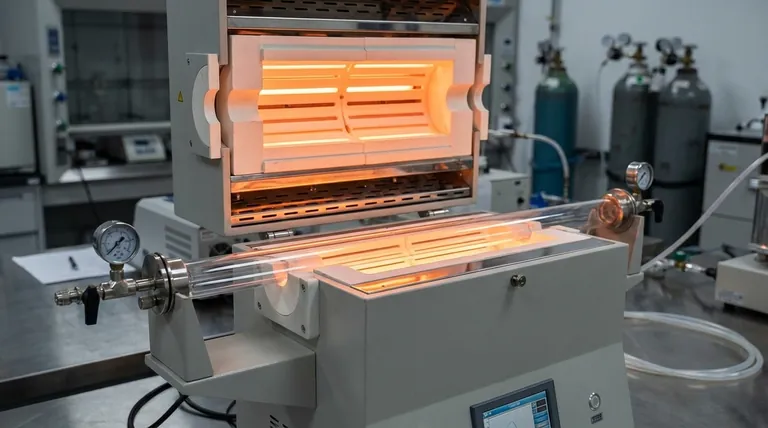
From Material Strength to System Integrity
To properly understand the limits of a quartz tube, you must distinguish between the inherent strength of the material and the performance of the component as a whole.
What Tensile Strength Means
The 7,000 psi figure refers to the tensile strength of the quartz material. This is a measure of how much pulling force (tension) the material can resist before it fractures.
This value is high, but it assumes a perfect, flawless piece of material. This is rarely the case in a real-world application.
Why Geometry Dictates Pressure Rating
Pressure inside a tube creates a force known as "hoop stress," which is constantly trying to push the walls of the tube outward.
A tube's ability to resist this stress depends directly on its geometry. A tube with a thicker wall and a smaller diameter can withstand significantly more internal pressure than a thin-walled, large-diameter tube made of the same material.
Calculating for a Specific Tube
Because of the geometric dependency, a pressure rating must be determined or calculated for the exact dimensions of the tube you are using. Reputable manufacturers will provide pressure and temperature ratings for their specific products.
Understanding the Critical Weaknesses
Quartz is a high-performance material, but it is not forgiving. Its strength is compromised by specific conditions that are crucial to understand for safe operation.
The Threat of Surface Flaws
Quartz is a brittle material, much like common glass. Its greatest weakness is its susceptibility to surface imperfections.
Even a minor scratch, chip, or abrasion creates a point of stress concentration. When pressure is applied, the force will focus on that tiny flaw, leading to a catastrophic and sudden failure far below the theoretical maximum pressure.
This is why quartz tubes must be handled with extreme care, avoiding any collisions or vibrations that could compromise their surface integrity.
The Impact of High Temperature
While quartz performs well at high temperatures, its strength is not constant.
The maximum long-term operating temperature for a quartz tube is typically 1100°C (2012°F). Above this, and especially approaching its softening point around 1200°C, the material loses its rigidity and will begin to deform or sag under even minimal pressure.
The Danger of Thermal Shock
Rapid changes in temperature create immense internal stress within the quartz. Heating or cooling a tube too quickly can cause it to shatter.
This is known as thermal shock and is a common cause of failure. Any pressurization should only occur when the tube is at a stable, uniform temperature.
How to Apply This to Your Project
Your operational strategy depends entirely on what you are trying to achieve.
- If your primary focus is high-pressure containment: Prioritize tubes with the thickest possible walls and the smallest practical diameter, and inspect the surface for any flaws before every use.
- If your primary focus is high-temperature processing: Understand that pressure limits decrease as temperature increases. Operate well below the 1100°C long-term limit and ensure the tube is fully supported to prevent sagging.
- If your primary focus is safety and reliability: Always operate well within the manufacturer's specified limits for both pressure and temperature, and implement strict handling protocols to protect the tube's surface.
Treating a quartz tube not as an item with a single rating but as a high-performance system with specific operational limits is the key to safe and successful use.
Summary Table:
| Factor | Impact on Pressure Rating | Key Consideration |
|---|---|---|
| Wall Thickness | Increases with thicker walls | A thicker wall can withstand significantly higher internal pressure. |
| Tube Diameter | Decreases with larger diameter | A smaller diameter tube is inherently stronger under pressure. |
| Surface Quality | Severely reduced by scratches/flaws | Any surface imperfection creates a point of failure. Handle with extreme care. |
| Operating Temperature | Decreases as temperature rises | Strength declines above 1100°C; pressure limits are lower at high temperatures. |
Ensure the Safety and Performance of Your Laboratory Processes
Choosing the right quartz tube for your specific pressure and temperature requirements is critical for both experimental success and operator safety. The theoretical strength of fused quartz is high, but the real-world performance depends entirely on the tube's dimensions, quality, and your operating conditions.
KINTEK specializes in providing high-quality lab equipment and consumables, including quartz tubes engineered for reliability. Our experts can help you select the perfect tube for your application, ensuring it meets your precise pressure and temperature needs while maximizing durability.
Don't leave your lab's safety to chance. Contact our technical team today for a personalized consultation. We'll help you navigate the complexities of material selection to ensure your high-temperature systems operate safely and effectively.
Visual Guide

Related Products
- 1400℃ Laboratory High Temperature Tube Furnace with Alumina Tube
- Laboratory High Pressure Vacuum Tube Furnace
- 1200℃ Split Tube Furnace with Quartz Tube Laboratory Tubular Furnace
- 1700℃ Laboratory High Temperature Tube Furnace with Alumina Tube
- Laboratory Rapid Thermal Processing (RTP) Quartz Tube Furnace
People Also Ask
- How do tube furnaces assist in chemical activation for activated carbon? Optimize Pore Structure & Surface Area
- What is the function of a quartz reaction tube in PROX activity testing? Ensure High-Purity Catalyst Performance
- What is the necessity of using a vacuum tube furnace for Boron Carbide (B4C)? Achieve Optimal Preform Sintering
- What is a diffusion furnace? The Engine of Semiconductor Manufacturing
- Why is a controlled atmosphere tube furnace required for palladium nanoparticle reduction? Achieve Catalyst Precision
- What are the different types of biomass conversion technologies? Choose the Right Path for Your Energy Needs
- What is a split tube furnace? Unlock Unmatched Access for Complex Lab Setups
- Why are high-purity ceramic tubes used in high-temperature oxidation reaction chambers? Optimize Your Research Integrity








